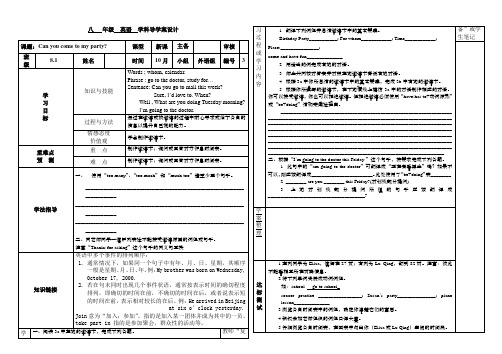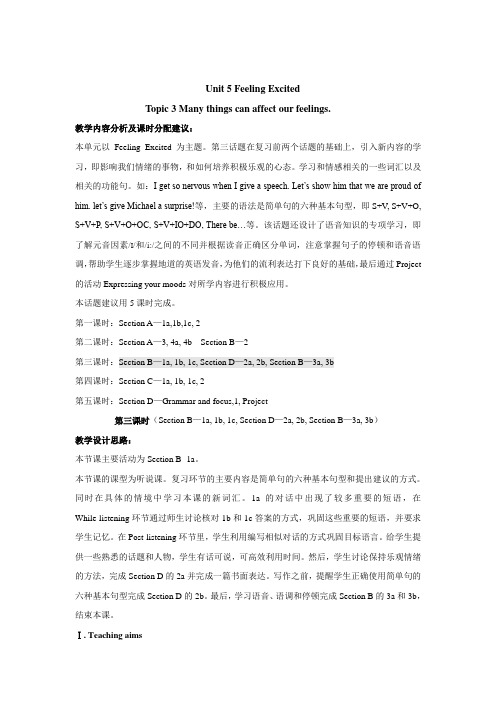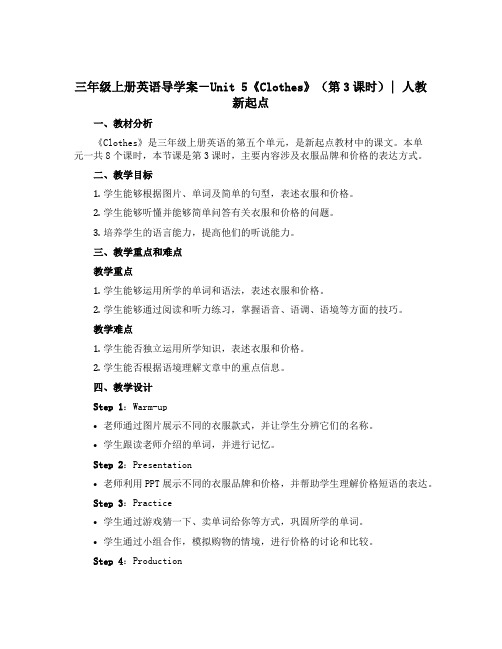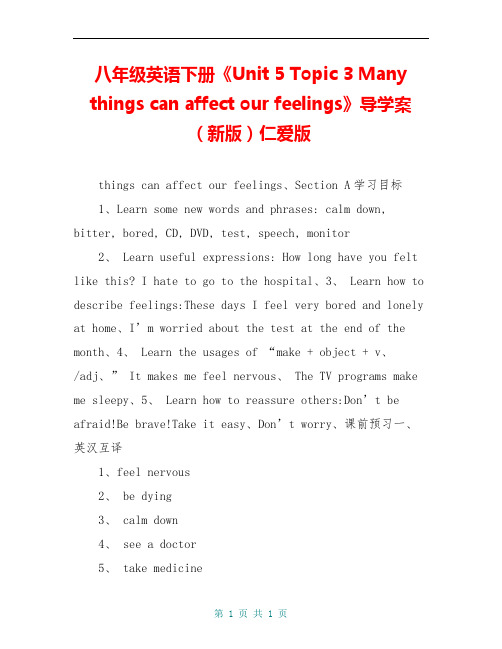Unit5__第3课时导学案
unit5.Can you come to my party第3课时附教学反思

______________________________________________________________________________
________________________________________________________________________________________________________________________________________________________________________________________________________________________________________________________________________________________________________________________________________________________________________________________________________________________________________________________________________________________________________________________________________________________________________________________二、根据“I’mgoing to the doctorthis Friday.”这个句子,按要求完成下列各题。
八年级英语下册Unit 5 Topic 3 第3课时精品教案 最新仁爱版

Unit 5 Feeling ExcitedTopic 3 Many things can affect our feelings.教学内容分析及课时分配建议:本单元以Feeling Excited 为主题。
第三话题在复习前两个话题的基础上,引入新内容的学习,即影响我们情绪的事物,和如何培养积极乐观的心态。
学习和情感相关的一些词汇以及相关的功能句。
如:I get so nervous when I give a speech. Let’s show him that we are proud of him. let’s give Michael a surprise!等,主要的语法是简单句的六种基本句型,即S+V, S+V+O, S+V+P, S+V+O+OC, S+V+IO+DO, There be…等。
该话题还设计了语音知识的专项学习,即了解元音因素/ɪ/和/i:/之间的不同并根据读音正确区分单词,注意掌握句子的停顿和语音语调,帮助学生逐步掌握地道的英语发音,为他们的流利表达打下良好的基础,最后通过Project 的活动Expressing your moods对所学内容进行积极应用。
本话题建议用5课时完成。
第一课时:Section A—1a,1b,1c, 2第二课时:Section A—3, 4a, 4b Section B—2第三课时:Section B—1a, 1b, 1c, Section D—2a, 2b, Section B—3a, 3b第四课时:Section C—1a, 1b, 1c, 2第五课时:Section D—Grammar and focus,1, Project第三课时(Section B—1a, 1b, 1c, Section D—2a, 2b, Section B—3a, 3b)教学设计思路:本节课主要活动为Section B -1a。
本节课的课型为听说课。
复习环节的主要内容是简单句的六种基本句型和提出建议的方式。
译林版六年级上册第五单元Unit 5 Signs第3课时教案

Do (not) + V…
对公共标识进行问答:
What does it mean?
It means …
Step 3 Checkout time
1.Listen and choose
T: Well. Here are some public signs for you.(标识分为红色和蓝色两种不同的颜色)
It means you can’t eat or drink there.
Model 2:What do these signs mean?
They mean No parking.
3. Retell the story
Step 2 Presentation
1.Look and say
a. T: I’ve got a picture. Please look it over, then find out some information for me. You can use these keys words to ask some questions like these?
该环节以学生为主,教师为辅,放开手让学生去发现规律,老师总结规律。对高年级学生来说更有利于他们自主学习能力的进一步发展。
授后小记:
本节课学习sound time的相关知识点,与内容较少,也比较简单,所以我加入了一些练习,巩固本单元的知识,效果比较好。Assignment环节以学生为主,教师为辅,放开手让学生去发现规律,老师总结规律。对高年级学生来说更有利于他们自主学习能力的进一步发展。授课日期月日
What bird girl shirt shirt,
Who
三年级上册英语导学案-Unit 5《Clothes》(第3课时)|人教新起点

三年级上册英语导学案-Unit 5《Clothes》(第3课时)| 人教新起点一、教材分析《Clothes》是三年级上册英语的第五个单元,是新起点教材中的课文。
本单元一共8个课时,本节课是第3课时,主要内容涉及衣服品牌和价格的表达方式。
二、教学目标1.学生能够根据图片、单词及简单的句型,表述衣服和价格。
2.学生能够听懂并能够简单问答有关衣服和价格的问题。
3.培养学生的语言能力,提高他们的听说能力。
三、教学重点和难点教学重点1.学生能够运用所学的单词和语法,表述衣服和价格。
2.学生能够通过阅读和听力练习,掌握语音、语调、语境等方面的技巧。
教学难点1.学生能否独立运用所学知识,表述衣服和价格。
2.学生能否根据语境理解文章中的重点信息。
四、教学设计Step 1:Warm-up•老师通过图片展示不同的衣服款式,并让学生分辨它们的名称。
•学生跟读老师介绍的单词,并进行记忆。
Step 2:Presentation•老师利用PPT展示不同的衣服品牌和价格,并帮助学生理解价格短语的表达。
Step 3:Practice•学生通过游戏猜一下、卖单词给你等方式,巩固所学的单词。
•学生通过小组合作,模拟购物的情境,进行价格的讨论和比较。
Step 4:Production•学生通过口头表达或写作练习,表述他们所喜欢的品牌和价格,并与同伴进行交流。
Step 5:Homework•学生通过阅读练习,完成课后练习册的相关内容。
五、教学评价本节课主要内容为学生表述衣服品牌和价格。
通过游戏和情境的练习,能够有效地激发学生的兴趣,提高学生的积极性和参与度。
同时,通过口语和写作的练习,能够检验学生的掌握情况和英语表达能力。
教学效果良好时,可适当拓展一些扩展内容,如名人代言产品、讨论品牌的经典标志、讨论品牌是否重要等。
人教版英语八年级上册Unit5导学案及答案

Unit5:Do you want to watch a game show ?Section A一、单词、短语、句型默写1、情景喜剧2、新闻节目、新闻3、肥皂剧4、介意、头脑、心智5、忍受、站立6、教育的、有教育意义的7、打算、计划8、希望9、查明、弄清10、讨论、商量11、发生、出现12、预料、期待13、笑话、玩笑14、喜剧、喜剧片15、看游戏节目16、谈话节目17、运动节目18、才艺节目19、你认为谈话节目怎么样?20、看新闻21、一点点枯燥22、向/从......学习23、更有教育意义24、问题的答案25、看情景喜剧是放松的很好的方式。
26、我不能忍受肥皂剧。
27、我不介意它们。
28、我希望找出世界各地发生了什么事情。
29、开展关于......的讨论30、我最喜欢的电视剧节目31、我希望有一天成为电视台记者。
二、单元语法讲练动词不定式是动词的一种非谓语形式,,其结构是“to+动词原形”,动词不定式的否定形式是在to前面加上not(即not+to+动词原形)。
动词不定式的用法如下:1、作主语:动词不定式作主语通常用it来作形式主语,而把动词不定式结构放在句子后面。
常见句型:It’s +形容词+for sb +to do sth .(翻译)喂养动物是我的工作。
对于我们来说早上读英语是很重要的。
2、作宾语或宾语补足语:即两个动词在一个句子中前后通常用to连接,to后跟动词原形。
注意:动词不定式的否定形式是在to前面加上not。
(翻译)他想去购物。
他想要我保持房间整洁。
我决定了什么时候去旅行。
他要求我在上学的日子不要看电视。
注意:(1)一听(hear)二看(see、watch)三使让(make、let)后跟动词原形不加to。
I hope I can make my dream (come) true one day . I saw them(bring)out the best in them on TV yesterday .(2)有些动词如like、love、enjoy、spend、finish、keep、mind、practice等后面的动词只能接动词ing形式。
八年级英语下册《Unit 5 Topic 3 Many things can affect our feelings》导学案(新版)仁爱版

八年级英语下册《Unit 5 Topic 3 Many things can affect our feelings》导学案(新版)仁爱版things can affect our feelings、Section A学习目标1、Learn some new words and phrases: calm down, bitter, bored, CD, DVD, test, speech, monitor2、 Learn useful expressions: How long have you felt like this? I hate to go to the hospital、3、 Learn how to describe feelings:These days I feel very bored and lonely at home、I’m worried about the test at the end of the month、4、Learn the usages of “make + object + v、/adj、” It makes me feel nervous、 The TV programs make me sleepy、5、Learn how to reassure others:Don’t be afraid!Be brave!Take it easy、Don’t worry、课前预习一、英汉互译1、feel nervous2、 be dying3、 calm down4、 see a doctor5、 take medicine6、 miss lessons7、听医生的建议8、在月底9、轮流做某事10、自学11、做演讲12、好好照顾二、根据首字母提示填空1、There is gong to be an English t tomorrow、2、Black coffee leaves a b taste in the mouth、3、 The soldier gave a s about saving people in Wenchuan、 All the people were moved and cried、4、I’m a shy girl、 I always feel n when I speak in public、5、Jane’s teacher made her m 、 she agreed、课堂环节1、复习电话用语并创设情景导入新课。
仁爱英语七年级下 Unit5 Topic3_导学案_文档
Unit5 Our School LifeTopic3 My School Life is Very Interesting Section A学习目标1.能拼读识记学科名词及重点短语。
2. 学会用英语表达自己的学校生活。
课前预习:1.熟读SectionAl单词,划出你不能拼读的单词_________________________2.翻译下列词组结束___________________ 在星期三_____________________上音乐课___________________ 什么课___________________________上英语课__________________ 谈论关于…_____________________知识点拨,合作探究1.What day is it today?今天星期几?It’s Wednesday。
星期三。
What day 用来对星期提问,其答语为“It’s +表星期几的名词”2.What class are they having ? 他们正在上什么课?They are having a music class. 他们正在上音乐课。
What class =Which class 什么课3.What time is it over?几点下课?What time对具体的时间、点提问。
be over结束,指状态。
如:School is over. 放学了。
4.How many lessons does he have every weekday? 他周一至周五每天上几节课?句型“How many +可数名词复数+…?”常用来询问可数名词的数量。
此外,对不可数名词的量提问用How much,如----How much milk do you have? ----A little.How much 还可以用来询问价格,如:----How much is this pair of shoes? ----Thirty yuan. 巩固练习一、填出所缺单词。
人教版七年级Unit5Do-you-have-a-soccer-ball?导学案
Unit5 《Do you have a soccer ball?》第一课时(1a-1c)导学案【学习目标】:1、掌握本节课的9个单词和2个短语2、学会句型Do you have -----?以及其回答Yes, I do. /No, I don't. 【学习重点】:学会就有关人与物所属关系进行问答的句子。
【学习难点】:句型Do you have -----?以及其回答Yes, I do. /No, I don't.【使用说明与学法指导】依据学习目标充分预习本课,勾画出重点,标记出疑点,在充分预习的基础上,独立认真的研究导学案的内容。
【预习案】将25页1a部分单词与图中物品配对。
【听力风暴】听录音,把1a部分单词按出场顺序标号。
【探究案】一.①Do you have a/an...? 你有...吗?该句是________引导的一般疑问句,句中的谓语动词____是一个实意动词。
在英语中,句子的谓语动词如果是实意动词,常借助于_____来引起疑问,主语是第三人称单数的句子中用_____引起疑问。
____或_____在这里没有实际意义,只是用来帮助构成一般疑问句。
其基本句式为:Do/Does+主语+动词原形+...? 针对训练:I have a basketball.(变一般疑问句)He knows Li Ming。
(变一般疑问句)二.回答这种一般疑问句,首先用___或_____作出肯定或否定回答,肯定回答是“Yes,主语(代词)+do/does.”否定回答是“No,主语(代词)+don’t/doesn’t.”1.——Do you know Jim?做肯否回答。
2.()Do they have a volleyball?A.Yes,they don’tB.No,they doC.Yes,they doD.No,they hasn’t3.( )_____she______a watch?A.Do;haveB.Do;hasC.Does;haveD.Does;has三.思考do/does还有哪些汉译,此时他是什么动词。
英语四年级上册unit5第三课时 教案
3.Introduce the table manners of different countries.
…
了解知识点:Would you like…?Yes, please. No, thanks.用来询问对方喜欢吃什么吗的意见及其回答方式。
Ss: Milk.
T:问一个学生What would you like?
S1: I’d like some milk.
教师继续在课件上出示几组食物图片,复习:What would you like? I’d like some…句型,然后给出两个情景(去吃鲁菜、西餐),问学生想要什么样的餐具?
二、呈现(Presentation)(10分钟)
(一)话题交流,导入新课
教师承接Free Talk上的话题告知学生:
T:Mike也很喜欢山东的鲁菜,今天Wu Yifan就邀Mike到他家做客了。看:Wu Yifan的妈妈正在热情的招待Mike呢,那么Mike想要使用什么餐具吃饭呢?Let’s watch and answer.
(二)情景创设,理解语意
---Would you like some soup?
---Yes, please
课后反思
【课后反思】
---Would you like some soup?
---Yes, please.
Unit Five Dinner’s ready
BLet’s talk
Help yourself.
---Would you like a knife and fork?
---No, thanks. I can use chopsticks.
高中英语必修1人教版精品导学案:Unit 5_Nelson_Mandela
Unit 5 Nelson Mand ela--- a modern hero第一课时:Warming-up & vocabulary预习导学本单元重点呈现:词汇部分:________ n.质量;品质;性质________ adj. 吝啬的;自私的________adj. 活跃的;积极的________ adj. 慷慨的;大方的________ n. 自我;自身________ adj. 自私的;________ adj. 无私的;忘我的________ adv.无私地;忘我地________ vt. (与to连用) 献身;专心于________ adj. 忠实的;深爱的________ vt.建立;建设________ n. 共和国;共和政体________ n. 法则;原则;原理________ adj. 和平的;平静的________ n. 人类________ n. 律师________ n.指导;领导________ adj. 法律的;依照法律的________ n.费(会费,学费等)________ adj. 怀有希望的________ n. 青年;青年时期________ n.同盟;联盟;联合会________ n. 舞台;阶段;时期________ vt. & vi. 投票;选举________ vt. 进攻;攻击;抨击________ n.暴力;暴行________ adj. 相等的;平等的________ adj. 乐意的;自愿的________ adj. 不公平的;不公正的________ vi. 逃脱;逃走;泄漏________ n. 毛毯;毯子________ vt. 教育;训练________ adj. 受过教育的;有教养的________ vi. 请求;乞求________ n. 亲戚;亲属________ n. 恐怖;可怕的人________ n. 残忍;残酷________ n. 报酬;奖金________ vt. 判决;宣判________ n. 总统;会长;校长________ n. 意见;看法;主张短语部分:填空2 .as a matter ________fact 事实上3. blow ________ 使充气爆炸4. ________danger 在危险、受罚、痛苦、忧虑等的处境中5. turn ________ 求助于;致力于6. lose ________ 丧失勇气或信心7. come ________power 当权;执政8. set ________ 建立;设立9. be sentenced ________ death判处死刑10. answer violence ________violence 以暴制暴11. be equal ________ 平等;相等12. ________the first time 第一次13 ________one’s opinion 依……看来14 reward sb. ________ 因为……酬谢某人15. be active ________ 活跃16. be ________to do sth. 愿意做某事17. devote oneself _______ 献身于18. believe ______ 相信19._______ a peaceful way 用一种和平的方式20. fight_____ 与…作斗争语法部分:定语从句以关系副词where, when, why,以及以介词(preposition)+关系代词(which/whom) 引导的定语从句1. The school where I studied for only two years was three kilometers away.2. The time when I first met Nelson Mandela was a very difficult period of my life.3. The reason why I got a job was because of my hard work.4. We were put into a position in which we had to accept we were less important, or fight the government.5. Mandela was the black lawyer to whom I went for advice.6. He was generous with his time, for which I was grateful口语交际部分:一、征求意见(Asking for opinions)1. What _____ you _______...?2. What's your _______?3. _____ are your ideas?4. Do you have any thoughts ____ that?5. _____ do you feel ____ that?二、发表意见(Giving opinions)7. I think/ I don't think...8. I believe / I don't believe(that)...9. In my ___10. ___ my understanding, …11. I feel that…/I don’t feel that…12. I’m ____ you.自主学习:根据下列句子及所给汉语注释,在横线上写出各单词的正确形式:1. It was___________ (大方) of you to give me a hand with my English.2. Your ___________ (亲戚) are the members of your family.3. In my _________(意见,观点), your plan is unreasonable.4. Do women have the right to __________ (投票)in your country?5. Two of the prisoners have ________ (逃跑) .6. You shouldn't think only about your own needs. It's too ____________ (自私)7. He is very ________ (吝啬)and has never paid the bill when we have dinner together.8. Some of the games are full of _________(暴力). Too much fighting is not good for young kids to play.9. Young people should be _________ (教育)in how to protect nature.10. He became _________(总统) of the United States this year.11. The official ordered the prisoners be __________ to death right away. (判处)12. Lots of ____________ lost their lives in fighting with the fire. (英雄)13. Many young people are __________ to be volunteers in helping those in poor areas. (愿意)14. He studied law in his __________, and later, he became a lawyer. (青年)15. The old man __________ the boy with a smile for helping him.(报答,酬谢)16. He _________ me in strength but not in intelligence. (平等)17. He was so poor that he had to _________ for his bread. (乞讨)18. He studied law in his spare time and became a ___________.(律师)19. They decided to ____________ a special economic zone in the city. (建立)20. He is over 90 and not ___________.(活跃)实战演练单词释义:从B栏找出A栏单词的英文释义A B1. principle: ready or able to take action2. escape: thinking only about one's own needs or wishes but not about other people'sneeds or wishes.3. active: basic truth, general law of cause and effect4. vote: belief or judgment not founded on complete knowledge5. opinion: willing to give money, spend time to help people6. generous: (right to give an) expression of opinion or will by person for or againstsomething, esp. putting up hands.7. devoted: something such as courage, honesty that people may have as part of theirnature.8. mean: get free, find way out9. quality: giving someone or something a lot of love or attention10. selfish: not wanting to spend money反馈检测单项选择:1. He remains _____in politics in his sixties.A. actB. actionC. activeD. activity2. Girls are equal ______ boys.A. inB. withC. onD. to3. The year 2008________ a series of events in China, like earthquake in Sichuan, Olympic games in Beijing.A .watched B. saw C. observed D. looked4. It is _____ of you to give me a hand with my English.A. generousB. kindnessC. importantD. necessary5. We must ____ the students to become useful people for our motherland.A. educateB. educationC. educatingD. educated6. It is against my _____ to tell lies.A. wordB. orderC. promiseD. principle7. The slave owners treated the slaves with great ______.A cruel B. cool C. cruelty D. warm8. The judge _____ him to two years in prison.A. judgeB. judgedC. sentencedD. sentence9. He was too ____ to pay for the meal.A . generously B. mean C. kind D. warm-hearted10. ----Sorry to ____ you, but could I ask you a question?----No problem.A . worry B. prevent C. trouble D. disappoint11. ---- Why does she always ask you for help?---- There is no one else_______.A . whose to turn to B. she can turn to C. whom to turn D. her to turn12. As a ___ for passing his examination, he got a new watch from his parents.A. giftB. presentC. rewardD. choice13. He has ___most of his time ___ painting.A. devote; toB. devotes; withC. devoted; toD. devoting; on14. The People’s Republi c of China was ____ in 1949.A. foundB. foundedC. findD. finding15. We’re ____. There is no time for argument.A. in the troubleB. in troublesC. in troubleD. in a trouble第二课时:Reading预习导学重点词汇:1. ____ (vt.)献身----- ____ (n.)2. _____(n.)和平-----_____(adj.)和平的-----_____(adv.) 和平地3. _____(n.)法律----- _____(n.)律师----- _____(adj.)合法的;法定的4. _____(n.)青年-----(adj.)_____青年的;年轻的5. ______(n.)暴力-----_____ (adj.)暴力的6. ____ (adj.)平等的-----____ (adv.)平等地-----_____ (n.)平等7. _____(n.)自我-----____ (adv.)自私地-----_____(adj.)无私的------_____(adv.)无私地8. _____ (n. & v.) 希望-----____( adj.)有希望的-----_____(adv.)有希望地阅读课文:一、判断正误:1. When he met Mandela in 1953, Elias was in a very poor condition in his life.2. His family could afford the school fees and the bus fare.3. He received good education.4. He joined the ANC Youth League.5. Elias was unwilling to help people achieve their dream of making black and white people equal.6. Elias was willing to blow up government buildings.7. At last, they decided to answer violence with violence.二、根据课文内容填空:Elias’ story1. The first time when I met Nelson Mandela was a very difficult period of my life.2. This was a time when one had got to have a passbook to live in Johannesburg.3. The last thirty years have seen the greatest number of laws stopping our rights and progress….4…. We were put into a position in which we had either to accept we were less important or fight the government.实战演练将下列短语译成英文:1. 丧失勇气、信心__________.2. 处于困难中__________3. 在....... 方面积极__________4. 失去工作__________5. 被判刑__________6. 等于,胜任__________7. 以暴力反抗暴力__________8. 事实上__________9. 炸毁__________10. 愿意做某事__________反馈检测阅读理解The vacation's over for American space tourist Richard Garriott on Friday, the 47-year-old computer games designer returned safely to Earth after a 10-day visit to the International Space (ISS). The capsule(太空舱)carrying Garriott and two astronauts successfully touched down near the town of Arkalyk, in the central Asian country of Kazakhstan.Garrioot's father, former NASA astronaut Owen Garriott, was there to greet his son on the ground. After the younger Garriott went out of the capsule, his father patted him on thehead, and asked, " How come you look so fresh and ready to go?" To which Garriott replied, " Because I'm fresh and ready to go again. What a great ride that was!"Interest in space tou people who can afford the high price.Garriott is the sixth private citizen to travel into space. On October 12, his dream of following his father's footsteps came true as he took off aboard an Russian rocket. Garriott is the first American to follow his father into space. The Austin, Texas resident paid$30 million for the holiday in orbit(轨道).b.Space plans to compare his photos with those his father took to see how Earth's environment has changed in the past 35 years.1. How did Richard Garriott feel after returning from space?A .Tired B. Excited C. Disappointed D. Satisfied.2. What do we know about Richard Garriott according to the passage?A. He followed his father's step into space.B. He was tired and didn’t want to go any more.C. He stayed in space for more than one month.D. He is the first private citizen to travel into space.3. He took pictures of the Earth's surface as his father did 35 years ago, he wanted to find out_____.A . Whether they chose different scenes to take photos.B. Whether they chose same scenes to take photosC. Whether the moon surface has changed in the past 35 years.D. Whether the earth environment has changed in the past 35 years.4. We can infer from the passage that________.A. Space travelling is becoming well received.B. Richard Garriott went into space with his father.C. Richard Garriott's father went into space 30 years ago.D. Traveling into space costs a lot of money.第三课时:Grammar预习导学根据课文内容填空:1. The time ______ I first met Nelson Mandela was a very difficult period of my life.2. It was in 1952 and Mandela was the black lawyer to ____ I went for advice.3. This was a time ____ one had got to have a passbook to live in Johannesburg.4. The places outside the towns____ they were sent to live were the poorest parts of south Africa.5. We were put into a position in ____ we had either to accept we were less important or fight the government.6. It was a prison from ____ no one escaped.7. He taught us during the lunch breaks and the evenings____ we should have been asleep.8. The school ____I studied for only two years was three kilometers away.9. The day ____ Nelson Mandela helped me was one of my happiest.要点点拨:定语从句:以where, when, why引导1. where 指______, 在从句中作_______. Where =in which.The school was three kilometers away. I studied in the school for only two years.____________________________________________________________________. When =on which/ in which/ at which.The time was a very difficult period of my life. I first met Nelson Mandela at the time._____________________________________________________________________ .Why=for whichThe reason was because of my hard work. I got a job for the reason._____________________________________________________________________ _.4.关系副词和关系代词的判断方法:关系副词和关系代词的选择是根据先行词在定语从句中的成分。
- 1、下载文档前请自行甄别文档内容的完整性,平台不提供额外的编辑、内容补充、找答案等附加服务。
- 2、"仅部分预览"的文档,不可在线预览部分如存在完整性等问题,可反馈申请退款(可完整预览的文档不适用该条件!)。
- 3、如文档侵犯您的权益,请联系客服反馈,我们会尽快为您处理(人工客服工作时间:9:00-18:30)。
Unit5 第3课时导学案
教学目标:
一.运用“四会”词cake, tea, banana, grapes, bread, candy, cookie造句,并用所学单词和句型进行对话。
二.学习what do you like?句型及其回答。
教学重点:
能听懂、会写、会读、会说cake, tea, banana, grapes, bread, candy, cookies
教学难点:掌握what do you like?句型及其肯定和否定回答。
教学环节:
一. 学习目标(2分钟)
(一)运用“四会”单词cake, tea, banana, grapes, bread, candy, cookie并用所学单词和句型造句和练习对话。
(二)学习what do you like?句型及其回答。
二. 自主学习(15分钟)
(一)温故知新
运用上节课所学知识操练对话:
1.师生问答。
A: Do you like …?
B: Yes, I do.\No,I don’t.
A: Does the monkey like …?
B: Yes, it does.\No, it doesn’t.
2.生生对话。
(二)导入新课
挂图演示,并引出句子what do you like?学生随即说出喜欢的东西.运用句子I like … very much。
They are nice.
(三)互助释疑
同桌间读对话,理解特殊疑问句的用法和回答。
(四)探究出招
小组合作用转换人称造句,并进行回答。
三. 展示交流(10分钟)
(一)小组展示
小组内练习用英语询问对方喜欢什么。
并说明理由
(二)班级展示
指名小组上讲台做游戏,用英语询问对方或者他人喜欢的东西是什么,并做回答。
四. 点拨升华(8分钟)
(一)教师放录音,学生跟读,纠正读音。
(二)学生开火车读单词。
(三)小组内分角色读对话。
(四)上台表演对话。
五. 课堂作业(5分钟)
(一)作业当堂清
1.单词拼写并说出汉语意思
c _ k _ t_ _ b _n_n c_ndy do_s
c_ _kie gr_p_s br_ _d li_e wh_t
(二)挑战自我
教师说句子,学生将听到的句子写出来,并翻译。
Do you like candies?Yes, I do。
what do you like?
I like cookies very much。
They are nice.
板书设计:
Unit 5 Do You Like Candies?
A: What do you like?
B:I like cakes very much。
They are nice.
A: What does your cat like?
B: It likes fish.
作业
1.单词拼写并说出汉语意思
c _ k _ t_ _ b _n_n c_ndy do_s
c_ _kie gr_p_s br_ _d li_e wh_t
2.教师说句子,学生将听到的句子写出来,并翻译。
Do you like candies?
Yes, I do。
What do you like?
I like cookies very much。
They are nice.。
